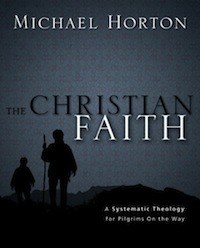 I recently received a copy of Michael Horton’s massive new systematic theology. It’s a big, heavy hardcover that weighs in at around 1050 pages. Several people have asked me if I would offer a review. I wish I could, but honestly, to review this book would be far beyond my capabilities. Not only would it take me weeks to read (though they would be profitable weeks, I’m sure) but I just do not have the theological background to offer anything more than the most cursory review. I’m aware of my limitations.
I recently received a copy of Michael Horton’s massive new systematic theology. It’s a big, heavy hardcover that weighs in at around 1050 pages. Several people have asked me if I would offer a review. I wish I could, but honestly, to review this book would be far beyond my capabilities. Not only would it take me weeks to read (though they would be profitable weeks, I’m sure) but I just do not have the theological background to offer anything more than the most cursory review. I’m aware of my limitations.
Having said that, I’ve looked through it enough to conclude that it seems likely to be the Presbyterian equivalent of Wayne Grudem’s Systematic Theology–the contemporary go-to for those seeking to learn about a particular point of doctrine coming from a defined point-of-view. It is laid out in a very attractive and useful way and in that way it removes some of the intimidation factor that comes through its topic and its bulk.
Horton’s book got me thinking. If I were to sit down to write this kind of a work, one that for many authors represents a magnum opus, how would I want to begin it? What words do you use to introduce a work of this magnitude and one that represents a lifetime’s study and thousands and thousands of hours of writing? I just had to know. So I went to my bookcase and pulled every systematic theology I could find. To satisfy my curiosity I turned to the first pages of each and wrote out the opening sentence. And here they are:
- Prolegomena (lit: pro, “before,” and lego, “speak”) is the introduction to theology. (Systematic Theology by Norman Geisler)
- In 1949, the English playwright and novelist Dorothy Sayers observed the common antipathy in her day toward doctrine: “‘Dull dogma,’ they call it.” (Michael Horton)
- In this book I will introduce you to the discipline of systematic theology. (Salvation Belongs to the Lord by John Frame)
- In every science there are two factors: facts and ideas; or, facts and the mind. (Systematic Theology by Charles Hodge)
- Nearly all the wisdom we possess, that is to say, true and sound wisdom, consists of two parts: the knowledge of God and of ourselves. (The Institutes by John Calvin)
- What is systematic theology? (Systematic Theology by Wayne Grudem)
- One may rightly say Christian theology is study or organized treatment of the topic, God, from the standpoint of Christianity. (Systematic Theology by Robert Duncan Culver)
- Works on dogmatic or systematic theology generally begin with the doctrine of God. (Systematic Theology by Louis Berkhof)
- Humans are wondrous and complex beings. (Christian Theology by Millard Erickson)
- Hundreds of the world’s space scientists are spending vast sums from their nations’ treasuries trying to make meaningful contact with imagined rational beings living in deep space. (A New Systematic Theology of the Christian Faith by Robert Reymond)
Looking at that list, I don’t think there are too many conclusion we can draw, are there? Except, perhaps, that Calvin gets the prize.









